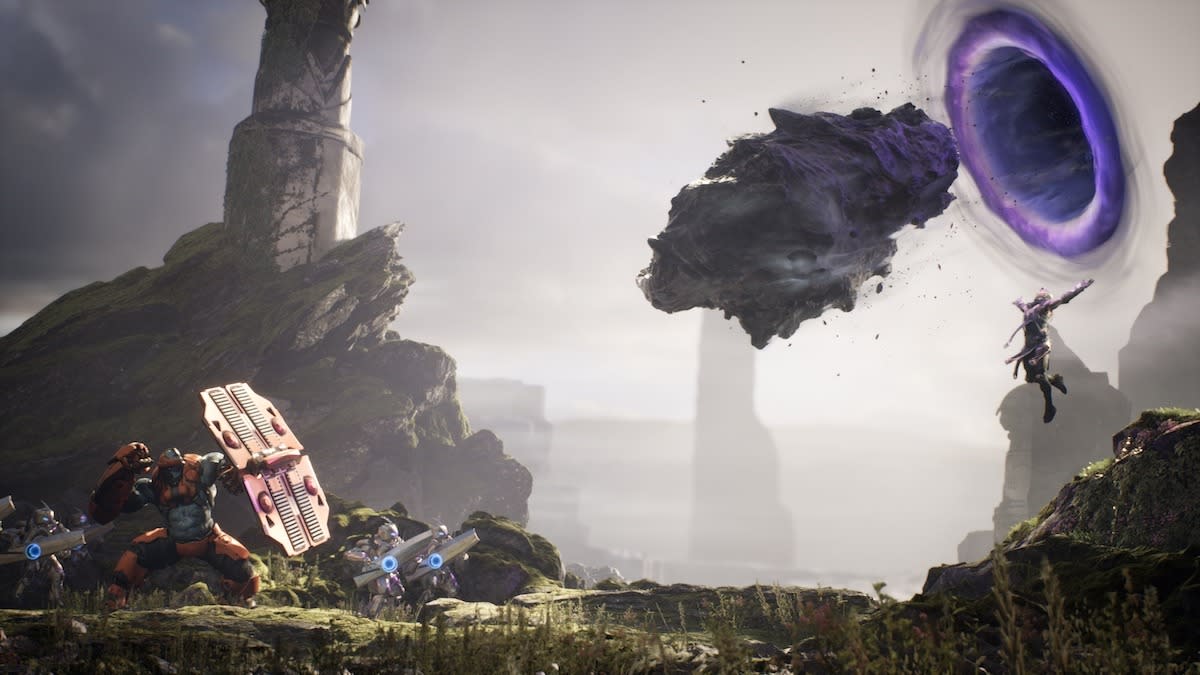Paragon Is Part Shooter, Part MOBA, All Fun

Image: Epic Games
You could almost hear the sigh when Epic Games first unveiled Paragon. Another MOBA? Another studio trying to cash in on the esports craze? Is this really what we need from the minds behind Unreal?
It turns out that, yeah, it just might be. While Paragon shares its structure with games like League of Legends, the game has just as much in common with the twitchy shooters on which Epic built its reputation as a first-rate game maker. It’s a MOBA by way of Gears of War, and it’s shaping up to be all kinds of fun.
You know the drill: Two teams of five heroes storm down three lanes, taking out automated towers, AI-controlled minions, and enemy heroes as they try to destroy their opponent’s base. But Paragon forgoes the top-down clickfest of most MOBAs and instead drops you into the action via a classic third-person perspective. The result is a game that feels like a MOBA — the push and pull of lane control, the emphasis on character abilities and teamwork — but plays like a shooter.
On the surface, that makes it a pretty newbie-friendly MOBA. If you’ve blasted through a few shooters over the past couple of years, you’ll be right at home roaming the map. But the better you understand the rhythms of a MOBA, the better you’ll perform in Paragon. I spent a few hours playing the game at a recent preview event, and it was immediately clear that while you can fall back on your twitch skills to shoot tons of minions in the face, success is in large part determined by how you play as a team.
Paragon currently features 13 heroes (more will likely be coming, though the company wouldn’t confirm a number) that loosely follow the archetypes of Tank, Fighter, Support, and Ranged. Thanks to responsive controls and potent abilities, it’s tempting to Rambo into battle, but that’s a recipe for disaster. A lumbering, bullet-sponge Tank needs Support to stay alive and maximize damage; a glass-cannon Caster needs to know when to attack and when to run for cover. Paragon gives you more straight-up aim control than other MOBAs, but step too far out of line and it will quickly punish your insolence.
During my first match, I went in overconfident that Twinblast, a newbie-friendly, gun-toting Nathan Drake lookalike, would be able to handle the waves of creeps and two other heroes pushing up the middle lane. And, to be fair, I lasted a lot longer than I would have in a traditional MOBA. But in the face of terrible odds, Twinblast was not long for this world. In Paragon, tactical mistakes trump shooter skills.
On the flip side, the dropped camera and 3D world mean you can rely on shooter concepts like verticality and cover to get a leg up. Get to high ground and you can pick off heroes quickly and quietly, ducking behind terrain to avoid fire. It’s a true hybrid; even the developers can’t seem to decide whether MOBA players or shooter vets are better equipped going in.

Image: Epic Games
Speaking of which, Epic also unveiled the game’s interesting card-based upgrade system. As you take down enemies, you gain points to spend back at your base to buff and augment your character. You do this by leveling up cards from a prebuilt deck, which can, for instance, boost your critical hit damage, increase your dodge speed, or just replenish health. Choosing which cards to equip and maximizing your point spend is crucial.
And by crucial, I mean a smartly upgraded hero can totally turn the tide of battle. Guided by a developer, I turned Murdock, a high-damage, low-health Ranger, into a devastating hero-demolishing, lane-clearing tool of destruction by obsessively upgrading his shotgun. Obviously Epic is still balancing it out, but it’s abundantly clear that using cards the right way is essential in Paragon.
It’s also a little complicated. Figuring out which cards grant which abilities and how best to upgrade is currently pretty wonky. Epic is sill working on the interface, and an offline deck-building tool should help players acclimate to the game’s vocabulary, but it’s not quite as intuitive as it should be.
Paragon will come packed with a replay system and direct upload tools, so sharing clips should be a cinch. It will also support cross-play between the PS4 and PC.
So will it be the next big esport? Epic Games is being careful not to use that word, of course — it takes a critical mass of players, a passionate fan base, and a great deal of luck to be considered a viable esport. It’s far too early to tell Paragon’s future, but with an interesting blend of genres and smartly designed characters, it’s certainly one to watch. Paragon is due out later this year.
Ben Silverman sucks at MOBAs but he likes them a lot. He’s on Twitter at @ben_silverman

